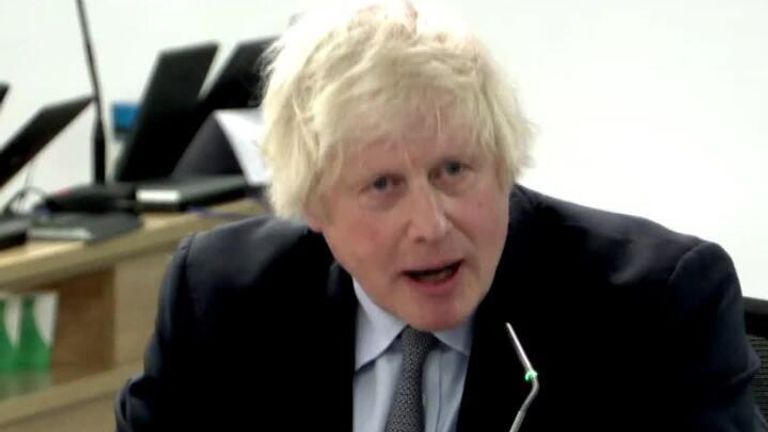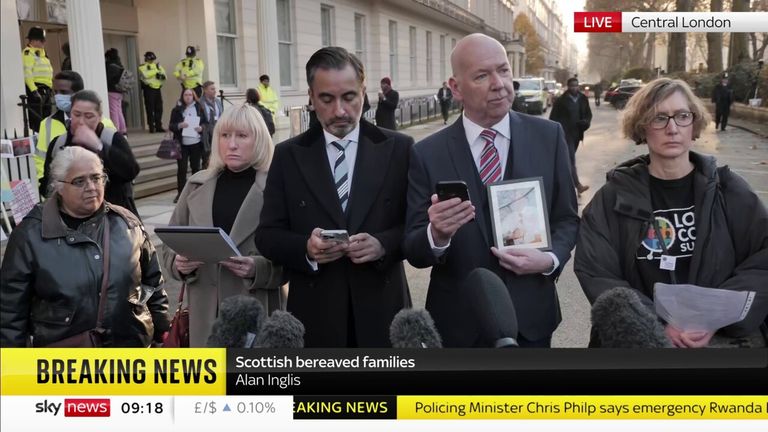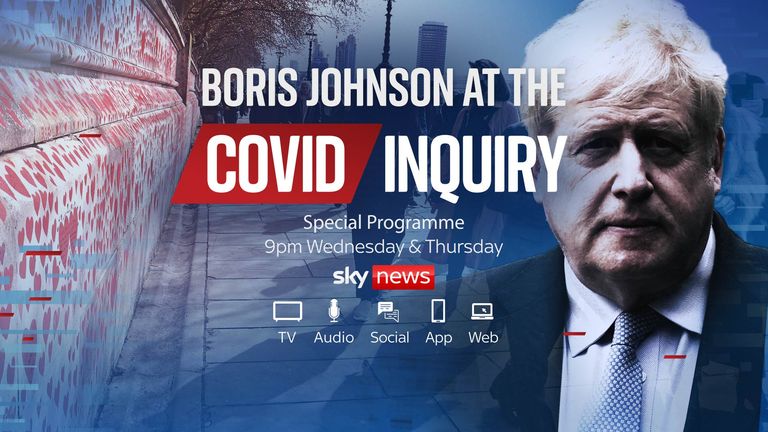Boris Johnson gives evidence to COVID inquiry - the key moments
The former prime minister spent two days in front of lawyers, answering questions over the decisions he made during the pandemic. We look at the key movements from his hearings.
Thursday 7 December 2023 18:29, UK
Boris Johnson has finished giving his two days' worth of evidence to the COVID inquiry.
Here are the key points from the former prime minister's answers at a glance:
Johnson apologises - but it doesn't go down well with bereaved families
As expected, given it was trailed in the press (much to the inquiry's displeasure) the former prime minister began with an apology "for the pain and loss and suffering" caused by the pandemic. He acknowledged that "unquestionably" his government "may have made mistakes" in its handling of the crisis and said he hoped the inquiry could provide answers for victims and bereaved families.
The statement was interrupted by four women, all who lost loved ones during the pandemic, holding signs saying "the dead can't hear your apologies". They were removed from the inquiry and said they didn't want his "waffle".
He accepts personal responsibility for all decisions - but won't be drawn on specific mistakes
Mr Johnson was pressed on what mistakes he was referring to in his opening statement and said this was "broadly around messaging and particularly different messaging coming from Number 10 and the devolved administrations". He said this was something to be "sorted out in the future" but when pressed on whether this was the "main mistake" he said he would struggle to give a hierarchy and it would be easier to "explain what happened as we go".
However, he said he takes "personal responsibility for all decisions made", including the timing of the multiple lockdowns and the "explosion" of the virus in care homes.
'Strong arguments against early lockdown'
On the timing of the first lockdown - which previous witnesses said should have come sooner than 23 March - Mr Johnson said there were "strong arguments against going too early", including the issue of "behavioural fatigue" and "the risk of bounce back". He said the arguments were "made powerfully and they certainly had a big effect on me".
Later in the session, he rejected the suggestion that he had shown poor leadership by oscillating over whether to back tough restrictions, saying it would have been "negligent" not to look at the downsides of lockdown, such as costs to the economy.
Anti-lockdown arguments 'given pretty short shrift'
However while looking at the downsides Mr Johnson said he came to the conclusion by mid-March there was "nothing else" he could do than lock down if he wanted to protect human life, saying he gave arguments against it a "pretty short shrift". "I had no other tool (than lockdown)," he said. "Literally nothing else."
Bed blockers comment 'showed cruelty of choice we faced'
Having apparently accepted the need for lockdown, Mr Johnson went on to question why his government was "destroying everything for people who will die anyway soon, bed blockers" a few days later, according to notes of a meeting on 19 March shown to the inquiry.
Mr Johnson said the comment was not "designed to be publicly broadcast" and, rather than showing a lack of consistent position, was an indication "of the cruelty of the choice that we faced and the appalling balancing act that I had to do throughout the pandemic".
Later in his evidence, he insisted he did not back a "let it rip" strategy as cases began to rise in the autumn of 2020, despite claims in notes from advisers.
He instead claimed the extract represented an example of a government that did not want to impose a lockdown "until the last possible moment".
Time in intensive care
Mr Johnson appeared somewhat emotional as he recalled his own time in hospital with COVID in April 2020.
Saying it was the first time he had spoken about his experience of intensive care in public, the ex-prime minister added: "I saw around me a lot of people who were not actually elderly.
"In fact, they were middle-aged men and they were quite like me. And some of us were going to make it and some of us weren't.
"And what I am trying to tell you in a nutshell - and the NHS, thank God, did an amazing job and helped me survive - but I knew from that experience what an appalling disease this is."
'I should have twigged sooner'
While Mr Johnson defended the timing of the first lockdown, he admitted that in hindsight he should have "twigged" sooner about the risks of the virus, saying scenes from Italy in mid-February, when several areas went into lockdown, "really rattled me".
He said he had read the death rate was 8% but his instinct was "this cannot possibly be right" adding: "We should have twigged much sooner...I should have twigged."
Eat Out to Help Out
In earlier hearings, government scientists claimed they had not been told about the Eat Out to Help Out scheme - nor asked for their advice about it - as question marks remain over whether it led to a rise in inflections.
But Mr Johnson said he was "perplexed" by that evidence.
He instead claimed the scheme, designed to help out the hospitality sector after lockdown, was not seen as a "particular gamble" at the time.
And he said he was "not confident that there is substantial evidence" it impacted case numbers.
Johnson disputes excess death statistics
Back to the issue of mistakes, Mr Johnson was pressed repeatedly on whether the government's response led to more excess deaths, with inquiry counsel Hugo Keith KC pointing out that the UK had the second highest rate in western Europe after Italy. The former prime minister disputed those statistics repeatedly, saying he has seen figures showing the UK "well down the European table and even further down the world table".
He said an "extremely elderly population", a high rate of "COVID-related morbidities" and high population density also influenced the death rate. Asked again whether government actions materially affected the outcome, Mr Johnson said: "The answer is I don't know."
Read More:
Whatever Boris Johnson said, the evidence pointed to leadership failures
No 10 had 'unbelievably bullish' approach to pandemic
Hancock: UK should have locked down three weeks earlier
Partygate
Mr Johnson appeared a little tetchy when the topic of lockdown breaking parties was raised at the inquiry.
So-called "partygate" played a bit role in the ousting of the prime minister last summer, and a committee ruled he had lied about it to parliament - leading him to quitting as an MP.
Asked about it by the laywer, Mr Johnson complained about how partygate had been presented to the public, calling them "dramatic" and "absolutely absurd".
Johnson plays down claims of toxic culture but admits it was 'male-dominated'
Much of the questioning centred on previous claims of a toxic culture of disarray and incompetence. Mr Johnson admitted his Number 10 was "too male-dominated" but he played down some of the inflammatory language contained in released WhatsApp messages, insisting any other administration under similar pressures would have behaved in the same way. (Alastair Campbell, Tony Blair's chief spin doctor, disputed this).
He said he wanted "an atmosphere of challenge with some strong characters giving me advice" and that he wasn't aware that civil servants did not want to join the Number 10 team because of the wider culture. However, he told the inquiry: "I think that the gender balance of my team should have been better."
Johnson apologised to female civil servant over language
While still discussing the alleged toxic atmosphere, Mr Johnson revealed that he had personally apologised to the former deputy cabinet secretary Helen MacNamara, who was referred to as a "c***" by his top aide Dominic Cummings. Mr Johnson told the inquiry he did not remember the remarks being made but must have seen them as he was in that WhatsApp group. "I have rung Helen MacNamara to apologise to her for not having called it out," he said.
Only read SAGE minutes 'once or twice'
During the inquiry Mr Johnson admitted he only read the minutes from the government's scientific advisory group (SAGE) "once or twice" during the pandemic. He said he relied on the chief scientific adviser Sir Patrick Vallance and the chief medical officer Sir Chris Whitty to relay the views of SAGE, which met hundreds of times, but "in retrospect it may have been valuable to hear the SAGE conversation unpasteurised itself".
Be the first to get Breaking News
Install the Sky News app for free


Inquiry told 5,000 WhatsApp messages missing
The inquiry also heard about 5,000 WhatsApp messages on Mr Johnson's phone from 30 January 2020 to June 2020 were unavailable to the inquiry. Mr Keith KC said a technical report provided by the former Tory leader's solicitors suggested there may have been a factory reset at the end of January 2020 followed by an attempt to reinstate the contents in June 2020, but Mr Johnson denied knowledge of that.
He said he had made plain during the legal battle between the Cabinet Office and the inquiry that his messages should be disclosed.
Matt Hancock had 'defects', but did his best
Mr Johnson defended keeping former health secretary Matt Hancock in his post, despite calls from Mr Cummings and others that he should have been sacked. He said Mr Hancock "may have had defects" but "I thought that he was doing his best in very difficult circumstances and I thought he was a good communicator". He later said he did consider removing him but there was no guarantee he would be "trading up" if he put someone else in.
Johnson described long COVID as b*s
Evidence released by the inquiry today showed Mr Johnson referred to long COVID as b*s and compared it to Gulf War Syndrome - an unexpected illness that affected veterans in the Gulf War. He said he "regrets" that language, did not think his notes would ever be published and said he was trying to "get to the truth of the matter" of what the syndrome was.




